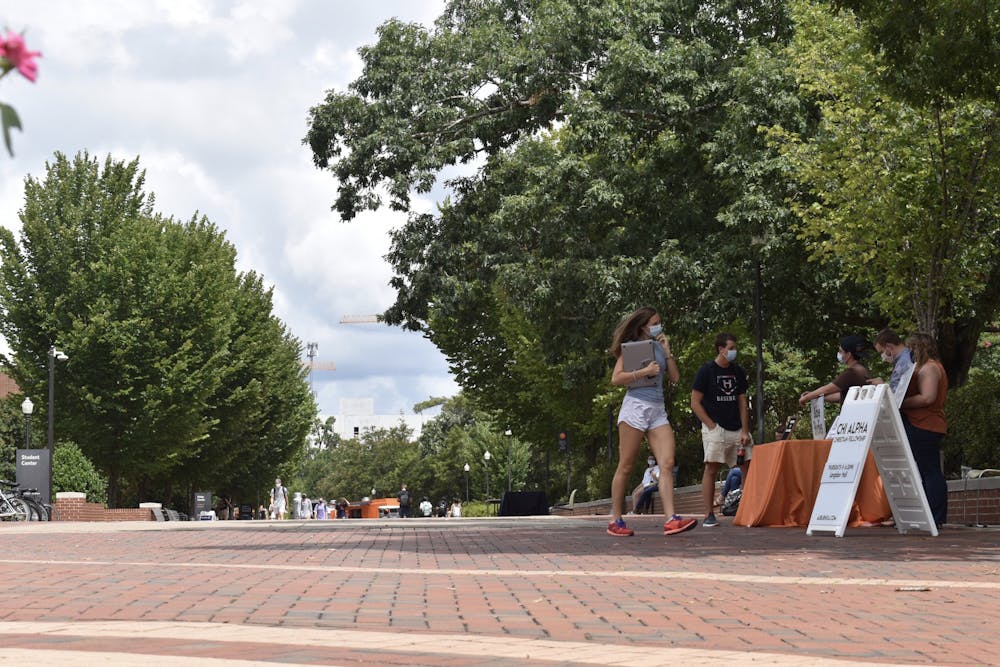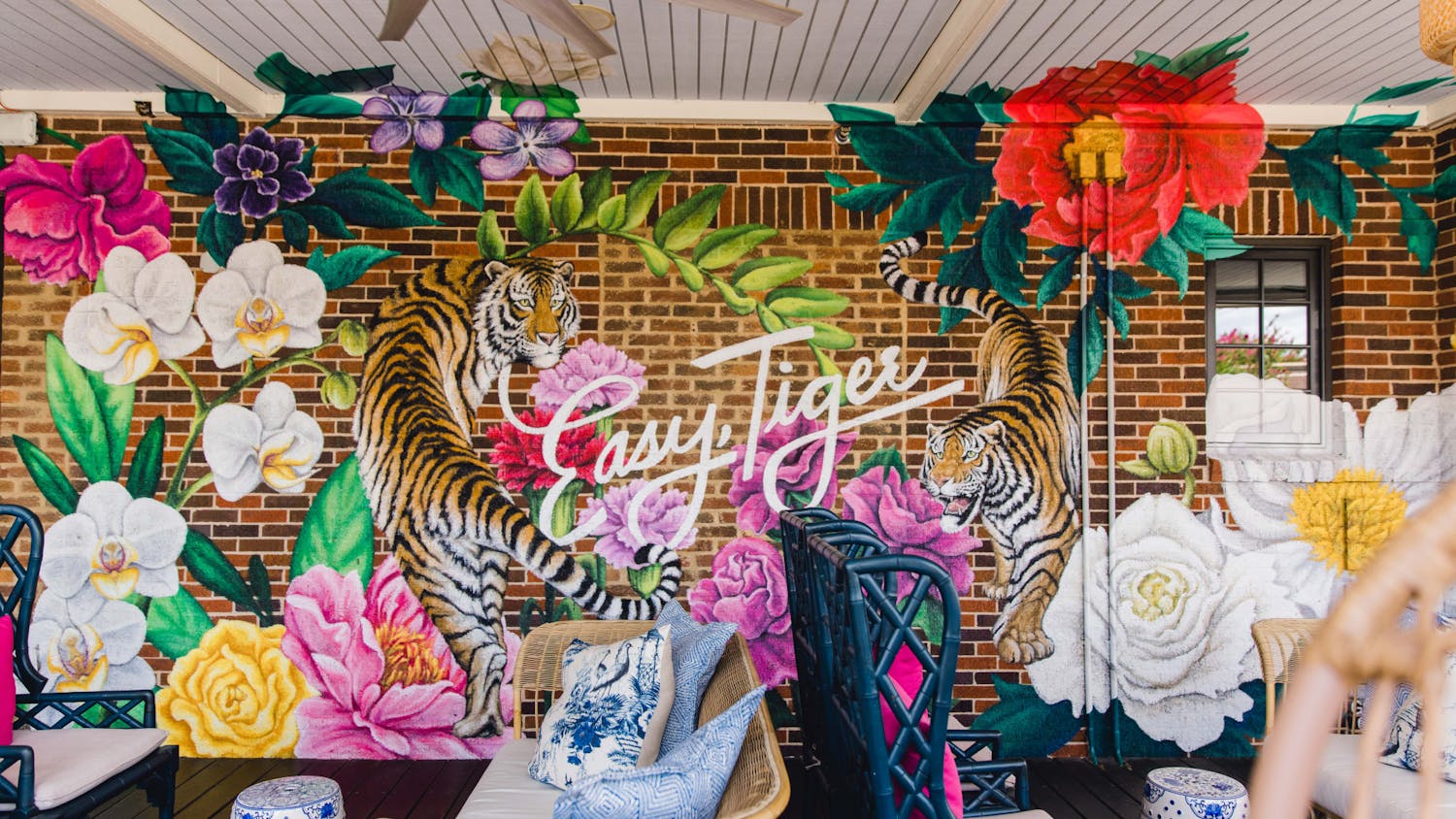The novel coronavirus at its face value is a highly contagious disease that has swept through the country. It’s more than that, though. Just as the physical symptoms of the virus affect everyone in different ways, so too do the side effects of our response: isolation, stress and frustration.
For Melissa Gilpin, sophomore in animal sciences, quarantine and online classes have made it much harder to get involved this year than in the past. In her first year at Auburn, she was involved with the Pre-Veterinary Medical Association and the Marine Biology Club.
“With those clubs we went to the University of Florida to go check out the vet school, we did that for like a whole weekend trip,” Gilpin said. “We were doing adoption events to get with the Lee County Humane Society, and before every meeting we’d come in and have social time, and it’s like with everything this semester, none of that’s happening.”
For Gilpin, almost everything is hard to plan, and it leaves people like her disconnected from the groups she was a part of in the past. Gilpin hasn’t heard much from her clubs this semester and isn’t even sure if they will meet at all.
“We haven’t even had our first meeting yet, so I actually have no idea … but at least for the stuff the school has been doing, I have been cautious and [I’m] not going for the most part,” Gilpin said. “I mean, as far as the clubs, if they had stuff, it depends on what it was. I might go. They haven’t said anything about activities or in-person things.”
Gilpin said she feels lucky to have made friendships in years past and credits those friendships in helping her deal with the mental effects of quarantine.
“I definitely feel like [mental health] is a little bit of an issue for certain people,” Gilpin said. “I feel fortunate enough to already know a few people that I’m comfortable with. I don’t have to go out with a group of 20 people to be happy; as long as I have a small group of friends that I know and trust, I’m good. I can see how that’s an issue for a lot of people, especially if you don’t know anyone. If you only have online classes or only one or two classes in person, it’s hard to really get out and be sociable, and having mental health issues definitely makes that harder.”
While Gilpin has two classes that require her to be on campus — the lab component of biology and both the lecture and lab for her animal science class — some students, like Avery Richardson, sophomore in secondary education, have even less.
“I have one Monday lab that’s in person, but everything else is online,” Richardson said. “They went straight from being in-person to like, they didn’t even question it, they just said, ‘We’re doing Zoom.’”
While most of her classes are on Zoom, they’re all synchronous, which she said allows for some structure in her day. She also has the benefit of living with six of her sorority sisters, but the thing she misses most is Auburn itself.
“It’s kinda sad, because I’m literally in love with Auburn … I’m not getting to go on campus and see the red bricks everyday, and it’s kinda making me upset,” Richardson said. “And then when I go on walks, I’m like, ‘Oh my gosh, this is all that I’m missing and I’m getting to be here.’ It’s just upsetting.”
Besides the red bricks, Richardson said she also misses the relational component of class; Zoom can only do so much.
“I feel like, being an education major, I know what I’m missing relationally,” Richardson said. “I mean, the reason I’m in my major is to be relational, and I know my professors feel the same way … so to not have that component has been kind of detrimental to my learning experience. On Zoom, I can’t point to my screen and be like, ‘I have a question about this,’ and they can’t point to their board in order to clarify something. So it’s just kind of hard to get connected with someone that way.”
Richardson’s struggle to connect with others extends outside of the classroom, too.
Since this is the first year she’s getting to her major-specific classes, it’s hard to meet and study with other people in her major that she hadn’t met until this year.
While she feels like it’s an issue, Richardson said Auburn doesn’t have much room to work with.
“I’m not getting to meet one-on-one with anyone in my class to further my studying habits,” Richardson said. “I have no idea how Auburn steps that up, and I don’t even know if they can under health codes. I definitely think that that’s something that I personally would want to fix.”
While online classes can be difficult for a number of reasons, they are unique in that they allow students to tailor their schedule to fit their life much more than in-person classes do. For Sadok Aounallah, senior in software engineering, online classes have allowed him to effectively take a high course load alongside his job.
“It’s very different. In terms of work, in terms of school, I’m not gonna lie, I love having online classes; I’m taking 20 hours this semester, and I can just do it all in the comfort of my room,” Aounallah said. “I know a lot of people hate it, like I understand, because you have to self-discipline yourself to actually attend classes and stuff, but I don’t have to walk around.”
Now he can spend that time doing other things.
“It saves so much time out of the day that you get to spend sleeping,” he said. “I’m always in my room grinding away. It’s fine, I don’t know. I enjoy it.”
Having more time for school allows Aounallah to focus on his job as a resident assistant in Cambridge Hall. While he enjoys his work, COVID-19 has brought many complications.
“It sucks, because unless residents go to the Med Clinic and test positive or self report, there’s no way that you could prove that they’re positive, and a lot of them have been going out,” Aounallah said. “You’re put at risk, but at the same time housing has made it in a way where we have minimum exposure to residents, so it’s still kind of safe.”
Exposure to residents isn’t the only type of exposure Aounallah is worried about.
He’s been more conscious about his friends, too.
“Before, if I met someone, I’d shake their hand or what not, I’d hug my friends,” Aounallah said. “Now ... I have a really small circle of like five people that I always see; if they’re outside that circle, it’s elbow to elbow, far away and masks on. I don’t play with that.”
Like Richardson, Aounallah feels that Auburn has done well in establishing guidelines and providing the necessary resources to keep everyone safe and healthy. But for the situation to improve on campus, Aounallah said the culture has to be changed.
“You have to change the culture for people to realize that this is a thing,” Aounallah said. “It’s been going on since March … this is month seven. Auburn should have started earlier, but that doesn’t matter now. It’s already done. Even two weeks ago, last week, you saw people meeting up at houses; it’s still happening. And people aren’t taking it as seriously. So I don’t know how [they] could fight that, it’s more of our job.”
Do you like this story? The Plainsman doesn't accept money from tuition or student fees, and we don't charge a subscription fee. But you can donate to support The Plainsman.





